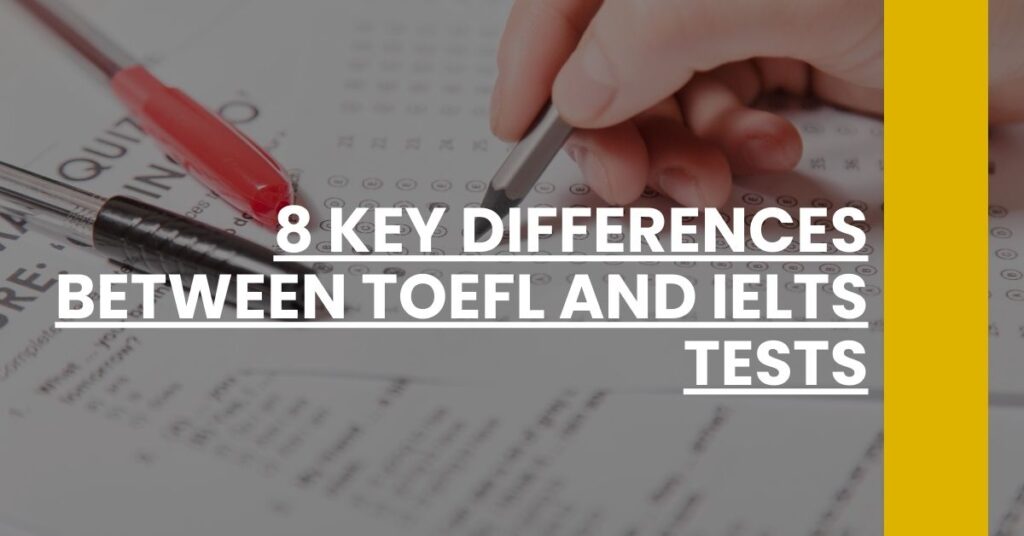Considering studying abroad or proving your English proficiency? The TOEFL vs IELTS debate is a pivotal decision for millions.
This article distills the essential differences, guiding you to the ideal test for your journey. With educational opportunities hinging on your score, understanding these nuances isn’t trivial—it’s critical.
Here, we illuminate the divergent paths of TOEFL and IELTS, ensuring your choice aligns flawlessly with your academic and professional aims.
- 1. Core Purpose and Wide Acceptance
- 2. Exam Structure and Section Overview
- 3. Question Types and Interaction Level
- 4. Scoring Systems and Result Interpretation
- 5. Speaking Section Nuances
- 6. Listening Section: Variations in Accents
- 7. Reading Section: Timing and Complexity
- 8. Writing Section: Tasks and Expectations
- Alternatives to TOEFL and IELTS
- Preparing for TOEFL or IELTS
- Conclusion: Making an Informed Choice
1. Core Purpose and Wide Acceptance
When navigating the crossroads of TOEFL vs IELTS, understanding their core purpose is crucial. Both are standardized tests designed to measure English language proficiency. However, their acceptance varies globally, and this could be the deciding factor for your plans.
- TOEFL (Test of English as a Foreign Language): Primarily used for studying in the United States, it is renowned for its American English focus. It’s the test of choice if you’re eyeing institutions in the U.S., as it is highly regarded by American universities. TOEFL’s widespread acceptance in over 11,000 universities across more than 150 countries makes it incredibly versatile.
- IELTS (International English Language Testing System): Your ticket to education in countries like Australia, Canada, New Zealand, and the UK. It has a broader acceptance for immigration purposes as well. With a focus on British English, IELTS is recognized by 11,000 organizations globally, including schools, employers, professional bodies, and immigration authorities.
The decision between TOEFL vs IELTS may simply come down to where you see yourself studying, working, or living. Know your destination, and choose accordingly.
2. Exam Structure and Section Overview
Each test has its unique blueprint—different sets of challenges that await you. Let’s chart the territory.
TOEFL:
- Reading: 60-80 minutes for 36-56 questions.
- Listening: 60-90 minutes with a batch of 34-51 questions.
- Speaking: A 20-minute exercise where you’ll respond to six tasks by speaking into a microphone.
- Writing: Two tasks spread over 50 minutes, testing your written communicative skills.
This four-hour test is varied and comprehensive, designed to scrutinize your English skills thoroughly.
IELTS:
- Listening: About 30 minutes for 40 questions, with a variety of voices and accents.
- Reading: 60 minutes for 40 questions that assess a wide range of reading skills.
- Writing: You’ll spend 60 minutes on two tasks that test your formal and informal writing abilities.
- Speaking: Unlike TOEFL’s recorded responses, this 11-14 minute segment involves a live conversation with an examiner.
Taking around 2 hours and 40 minutes, IELTS is shorter but equally rigorous.
The structure of these exams will dictate how you prepare and the strategies you adopt.
3. Question Types and Interaction Level
You’d think that being good at English is all it takes, right? Well, the type of questions you’ll encounter can be just as important to your success. Here’s a rundown:
- TOEFL: Get ready for questions that are largely multiple-choice. It feels like a marathon of standard exam-style queries, with some tasks that require you to speak or write answers based on reading and listening tasks.
- IELTS: Be prepared for a variety of question types – from short-answer questions to essay writing and interpreting graphical data. You’ll even engage in a face-to-face interview, which could either be unnerving or reassuring, depending on your comfort level with real-time conversation.
The level of interaction you’re comfortable with could be a major factor in choosing between TOEFL vs IELTS.
4. Scoring Systems and Result Interpretation
Don’t let the numbers baffle you; the scoring systems are distinct but interpretable. Here’s a concise guide:
- TOEFL Scores: Range from 0 to 120, with each of the four sections graded on a scale of 0-30. Your total score tallies these up. But remember, most institutions have a minimum score requirement—you’ll want to aim high.
- IELTS Scores: You’ll receive a band score from 0 to 9 for each section, and your overall score is the average. Some might say it’s easier to gauge where you stand with IELTS, but it’s also nuanced with half-bands like 6.5 or 7.5, adding precision to your proficiency level.
Understanding your score—and how it’s viewed by institutions—is crucial to achieving your goals.
5. Speaking Section Nuances
Are you ready for your close-up or more of a behind-the-scenes performer? The speaking sections of TOEFL and IELTS could sway your decision.
- TOEFL: Your voice will echo through a microphone as you record responses to given tasks, some based on reading or listening exercises. It’s a soliloquy that’s assessed electronically and by human raters.
- IELTS: Picture a dialogue, an actual conversation with an examiner. It’s a personal exchange, more organic, but potentially more intimidating if you’re not comfortable with spontaneous conversation.
The speaking test experience in TOEFL vs IELTS significantly varies, influencing which test better aligns with your communicative style.
6. Listening Section: Variations in Accents
When you’re preparing for English proficiency tests, the listening component can pose a unique challenge. The TOEFL vs IELTS tests differ not only in format but also in the range of accents you’ll have to decipher.
TOEFL’s listening section is akin to tuning in to an American radio station. You’ll be primarily hearing American accents, which might be music to your ears or a twist of the tongue depending on your familiarity with them.
On the flip side, IELTS plays a more global playlist. Expect to hear a medley of accents – from British to Australian, and even non-native English accents. This melange better reflects the English language’s true diversity and can give you an impressive linguistic workout.
Keep in mind, the broader range of accents in IELTS might require more comprehensive preparation but can also serve as beneficial exposure to the English you’ll hear in the real world. If international communication is your goal, this might be the key consideration in your TOEFL vs IELTS decision.
7. Reading Section: Timing and Complexity
Time and complexity are your silent opponents in the reading sections. Here’s how they come into play:
IELTS entrusts you with literature that spans academic and general interest topics. You’ll have 60 minutes to showcase your speed reading skills across three long passages. Quick comprehension and finding pertinent information swiftly are your tools for triumph.
In the TOEFL reading section, you’ll be vying for points by navigating passages that are academically styled, often excerpts from university textbooks. Pace yourself; you’ll get 60-80 minutes to complete this section, which means efficiency is key.
Both exams test your ability to understand, analyze, and infer information. Consider where your strengths lie:
- Speed and accuracy: IELTS might favor your capabilities.
- Academic endurance: TOEFL could be your stage.
The reading section is a race against time but remember, comprehension is the finish line.
8. Writing Section: Tasks and Expectations
Crafting the perfect response in the writing sections of both the TOEFL and IELTS tests involves clear understanding and strategic preparation. Your mission is to construct well-organized, coherent texts that adhere to academic standards.
TOEFL’s essay tasks ask you to draft responses based on reading and listening tasks, as well as support an opinion in writing. It’s critical to weave your responses with structure and substance. A knack for synthesizing information will serve you well here.
Contrastingly, IELTS requires you to interpret visual data for one task and present a logical argument or solve a problem in the other. The IELTS writing tasks prioritize a judicious use of English, a flair for critical analysis, and precision.
Your choice between TOEFL vs IELTS may hinge on your writing preferences:
- Articulate arguer? IELTS can be your canvas.
- Critical synthesizer? TOEFL awaits your structured prose.
Alternatives to TOEFL and IELTS
In your quest for English mastery acknowledgment, TOEFL vs IELTS isn’t an exhaustive list. There’s a world of alternatives that might align more closely with your ambitions, qualifications, or constraints. Here’s a snapshot:
- Duolingo English Test: A relatively new contender that’s conveniently virtual, and accepted by a growing number of institutions.
- PTE Academic: Focuses on everyday English rather than high-level academic skills, which might resonate more with your usage.
- Cambridge English Qualifications: Renowned for thorough assessment through extensive testing.
The landscape of proficiency testing is broad and diverse. Choose the path that aligns with your needs and circumstances.
Preparing for TOEFL or IELTS
A strategic approach to preparation can dramatically influence your performance. Here are some actionable tips to ensure you’re primed for whichever test you choose:
- Understand the format: Familiarity breeds success. Dive deep into the structure of each test.
- Polish your strengths and address your weaknesses: Tailor your study plan accordingly.
- Practise under real conditions: It’s not just about knowing English—it’s about performance under pressure.
- Use high-quality materials: Official practice tests and recommended resources are gold.
- Seek feedback: Whether it’s from a teacher or a study group, an outside perspective can be enlightening.
Your dedication and methodical preparation will pay dividends. Be persistent, be consistent, and the results will follow.
Conclusion: Making an Informed Choice
Deciding between TOEFL and IELTS is a thoughtful process that deserves careful consideration. Each test has its idiosyncrasies, its ebb and flow that you must navigate to emerge victorious. Your unique circumstances, goals, and preferences are pivotal to the decision.
Evaluate the academic and geographical implications, the sectional intricacies, and where your linguistic strengths lie. Whether your endeavors lead you to take the TOEFL or the IELTS, understand that this choice is not just a step in your educational journey—it’s a leap towards your global aspirations.
Let your TOEFL vs IELTS decision be an informed one, a decision that echoes your future success in the global arena.
TOEFL vs IELTS: Understand their differences, formats, and acceptability to choose the right English language proficiency test for you.

